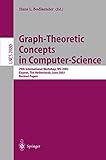Graph-Theoretic Concepts in Computer Science [electronic resource] : 29th International Workshop, WG 2003. Elspeet, The Netherlands, June 19-21, 2003. Revised Papers / edited by Hans L. Bodlaender.
Material type: TextSeries: Lecture Notes in Computer Science ; 2880Publisher: Berlin, Heidelberg : Springer Berlin Heidelberg, 2003Description: XII, 392 p. online resourceContent type: text Media type: computer Carrier type: online resourceISBN: 9783540398905Subject(s): Computer science | Data structures (Computer science) | Computer software | Electronic data processing | Computational complexity | Computer graphics | Combinatorics | Computer Science | Algorithm Analysis and Problem Complexity | Data Structures | Numeric Computing | Discrete Mathematics in Computer Science | Computer Graphics | CombinatoricsAdditional physical formats: Printed edition:: No titleDDC classification: 005.1 LOC classification: QA76.9.A43Online resources: Click here to access online
TextSeries: Lecture Notes in Computer Science ; 2880Publisher: Berlin, Heidelberg : Springer Berlin Heidelberg, 2003Description: XII, 392 p. online resourceContent type: text Media type: computer Carrier type: online resourceISBN: 9783540398905Subject(s): Computer science | Data structures (Computer science) | Computer software | Electronic data processing | Computational complexity | Computer graphics | Combinatorics | Computer Science | Algorithm Analysis and Problem Complexity | Data Structures | Numeric Computing | Discrete Mathematics in Computer Science | Computer Graphics | CombinatoricsAdditional physical formats: Printed edition:: No titleDDC classification: 005.1 LOC classification: QA76.9.A43Online resources: Click here to access online  E-BOOKS
E-BOOKS
| Current library | Home library | Call number | Materials specified | URL | Status | Date due | Barcode |
|---|---|---|---|---|---|---|---|
| IMSc Library | IMSc Library | Link to resource | Available | EBK4752 |
Invited Lecture -- Blow-Ups, Win/Win’s, and Crown Rules: Some New Directions in FPT -- Matching, Edge-Colouring, and Dimers -- Regular Papers -- Minimum Flow Time Graph Ordering -- Searching Is Not Jumping -- Incremental Integration Tools for Chemical Engineering: An Industrial Application of Triple Graph Grammars -- The Minimum Degree Heuristic and the Minimal Triangulation Process -- Generalized Parametric Multi-terminal Flows Problem -- Canonical Decomposition of Outerplanar Maps and Application to Enumeration, Coding, and Generation -- The Complexity of the Matching-Cut Problem for Planar Graphs and Other Graph Classes -- Tree Spanners for Bipartite Graphs and Probe Interval Graphs -- A Simple Linear Time LexBFS Cograph Recognition Algorithm -- Backbone Colorings for Networks -- Greedy Edge-Disjoint Paths in Complete Graphs -- Graph-Based Approaches to Software Watermarking -- Completely Connected Clustered Graphs -- An FPT Algorithm for Set Splitting -- Drawing Planar Graphs on a Curve -- Tree-Partitions of k-Trees with Applications in Graph Layout -- Resource Allocation Problems in Multifiber WDM Tree Networks -- An Improved Upper Bound on the Crossing Number of the Hypercube -- NCE Graph Grammars and Clique-Width -- Chordal Probe Graphs -- Subgraph Induced Planar Connectivity Augmentation -- On the Recognition of General Partition Graphs -- Short Cycles in Planar Graphs -- Complexity of Hypergraph Coloring and Seidel’s Switching -- Feedback Vertex Set and Longest Induced Path on AT-Free Graphs -- The Complexity of Graph Contractions -- Tree Spanners, Cayley Graphs, and Diametrically Uniform Graphs -- The Probabilistic Minimum Coloring Problem -- Recognizing Bipolarizable and P 4-Simplicial Graphs -- Coloring Powers of Graphs of Bounded Clique-Width -- Erratum -- Erratum: Cycles in Generalized Networks.
The 29th International Workshop on Graph-Theoretic Concepts in Computer Science(WG2003)washeldintheMennorodeconferenceCenterinElspeet,The Netherlands.TheworkshopwasorganizedbytheCenterforAlgorithmicSystems of the Institute of Information and Computing Sciences of Utrecht University. The workshop took place June 19–21, 2003. The 72 participants of WG 2003 came from universities and research institutes from 18 di?erent countries and ?ve di?erent continents. The workshop looks back at a long tradition. It was ?rst held in 1975, and has been held 20 times in Germany, twice in Austria, and once in Italy, Slo- kia, Switzerland, and the Czech Republic, and has now been held for the third time in The Netherlands. The workshop aims at uniting theory and practice by demonstrating how graph-theoretic concepts can be applied to various areas in computerscience,orbyextractingnewproblemsfromapplications.Itisdevoted to the theoretical and practical aspects of graph concepts in computer science. The goal is to present recent research results and to identify and explore - rections of future research. The talks given at the workshop showed how recent research results from algorithmic graph theory can be used in computer science and which graph-theoretic questions arise from new developments in computer science.


There are no comments on this title.